Global corporate strategy PDF
VerifiedAdded on 2022/01/13
|15
|4712
|34
AI Summary
Contribute Materials
Your contribution can guide someone’s learning journey. Share your
documents today.
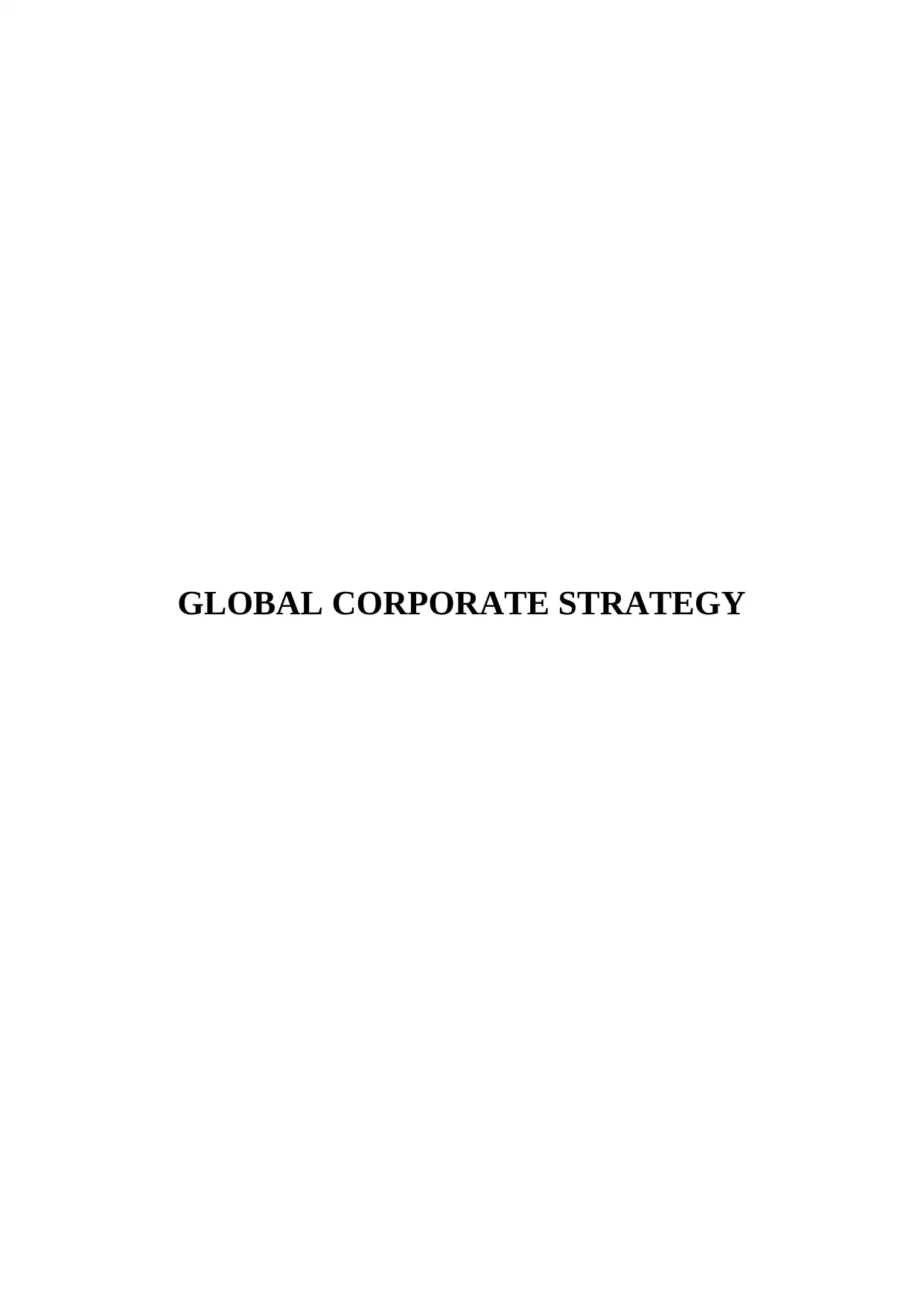
GLOBAL CORPORATE STRATEGY
Secure Best Marks with AI Grader
Need help grading? Try our AI Grader for instant feedback on your assignments.
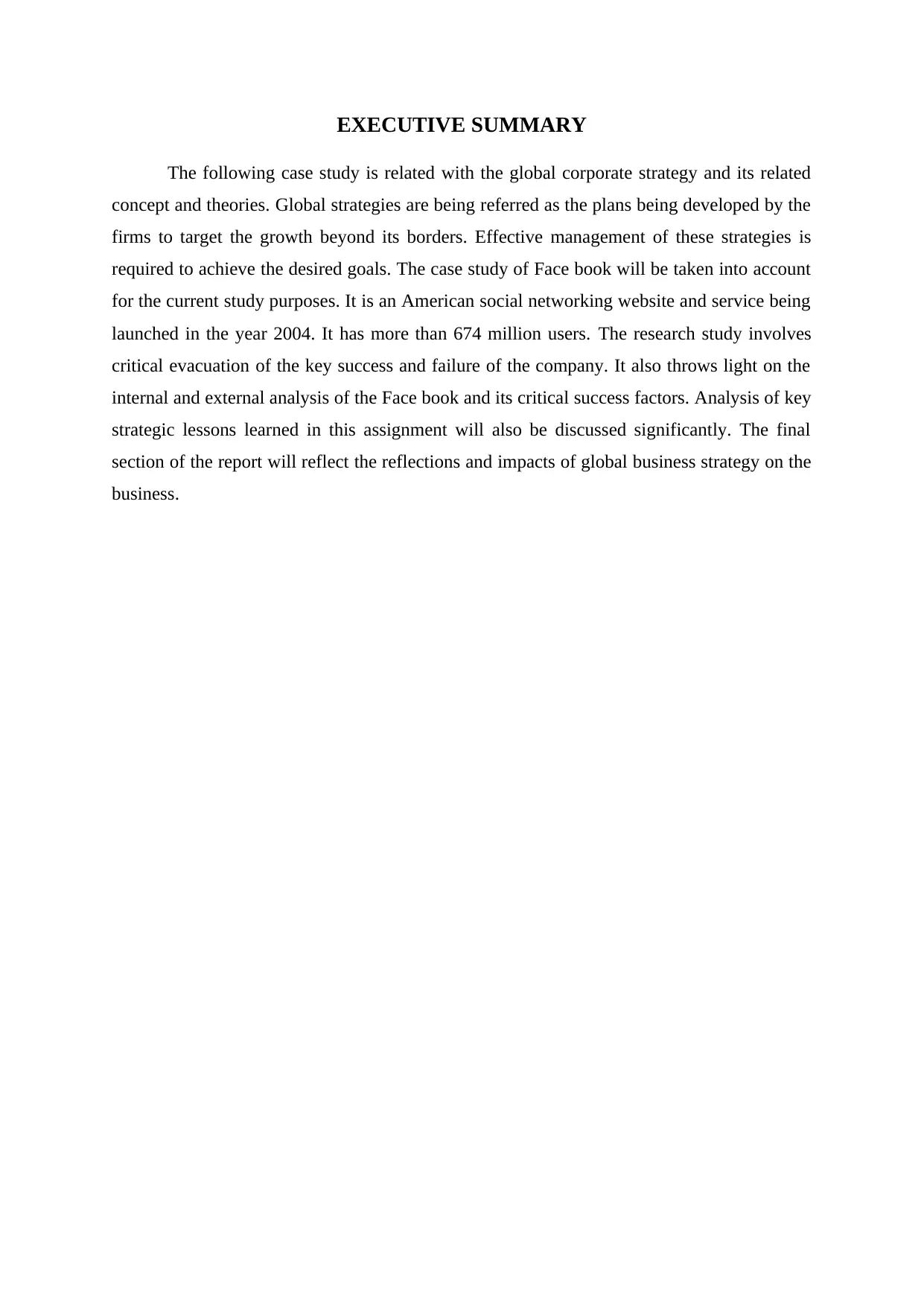
EXECUTIVE SUMMARY
The following case study is related with the global corporate strategy and its related
concept and theories. Global strategies are being referred as the plans being developed by the
firms to target the growth beyond its borders. Effective management of these strategies is
required to achieve the desired goals. The case study of Face book will be taken into account
for the current study purposes. It is an American social networking website and service being
launched in the year 2004. It has more than 674 million users. The research study involves
critical evacuation of the key success and failure of the company. It also throws light on the
internal and external analysis of the Face book and its critical success factors. Analysis of key
strategic lessons learned in this assignment will also be discussed significantly. The final
section of the report will reflect the reflections and impacts of global business strategy on the
business.
The following case study is related with the global corporate strategy and its related
concept and theories. Global strategies are being referred as the plans being developed by the
firms to target the growth beyond its borders. Effective management of these strategies is
required to achieve the desired goals. The case study of Face book will be taken into account
for the current study purposes. It is an American social networking website and service being
launched in the year 2004. It has more than 674 million users. The research study involves
critical evacuation of the key success and failure of the company. It also throws light on the
internal and external analysis of the Face book and its critical success factors. Analysis of key
strategic lessons learned in this assignment will also be discussed significantly. The final
section of the report will reflect the reflections and impacts of global business strategy on the
business.
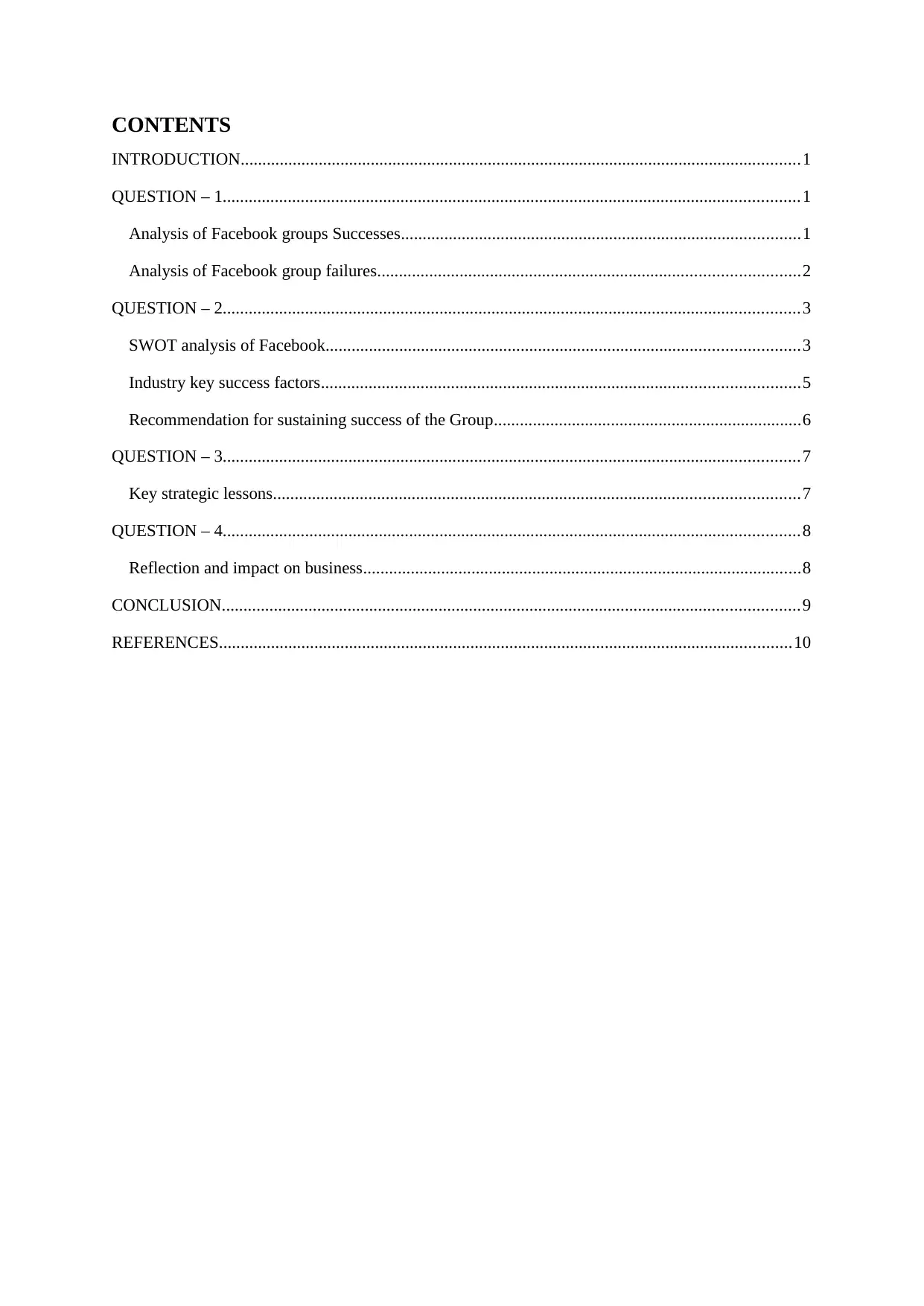
CONTENTS
INTRODUCTION.................................................................................................................................1
QUESTION – 1.....................................................................................................................................1
Analysis of Facebook groups Successes............................................................................................1
Analysis of Facebook group failures.................................................................................................2
QUESTION – 2.....................................................................................................................................3
SWOT analysis of Facebook.............................................................................................................3
Industry key success factors..............................................................................................................5
Recommendation for sustaining success of the Group.......................................................................6
QUESTION – 3.....................................................................................................................................7
Key strategic lessons.........................................................................................................................7
QUESTION – 4.....................................................................................................................................8
Reflection and impact on business.....................................................................................................8
CONCLUSION.....................................................................................................................................9
REFERENCES....................................................................................................................................10
INTRODUCTION.................................................................................................................................1
QUESTION – 1.....................................................................................................................................1
Analysis of Facebook groups Successes............................................................................................1
Analysis of Facebook group failures.................................................................................................2
QUESTION – 2.....................................................................................................................................3
SWOT analysis of Facebook.............................................................................................................3
Industry key success factors..............................................................................................................5
Recommendation for sustaining success of the Group.......................................................................6
QUESTION – 3.....................................................................................................................................7
Key strategic lessons.........................................................................................................................7
QUESTION – 4.....................................................................................................................................8
Reflection and impact on business.....................................................................................................8
CONCLUSION.....................................................................................................................................9
REFERENCES....................................................................................................................................10
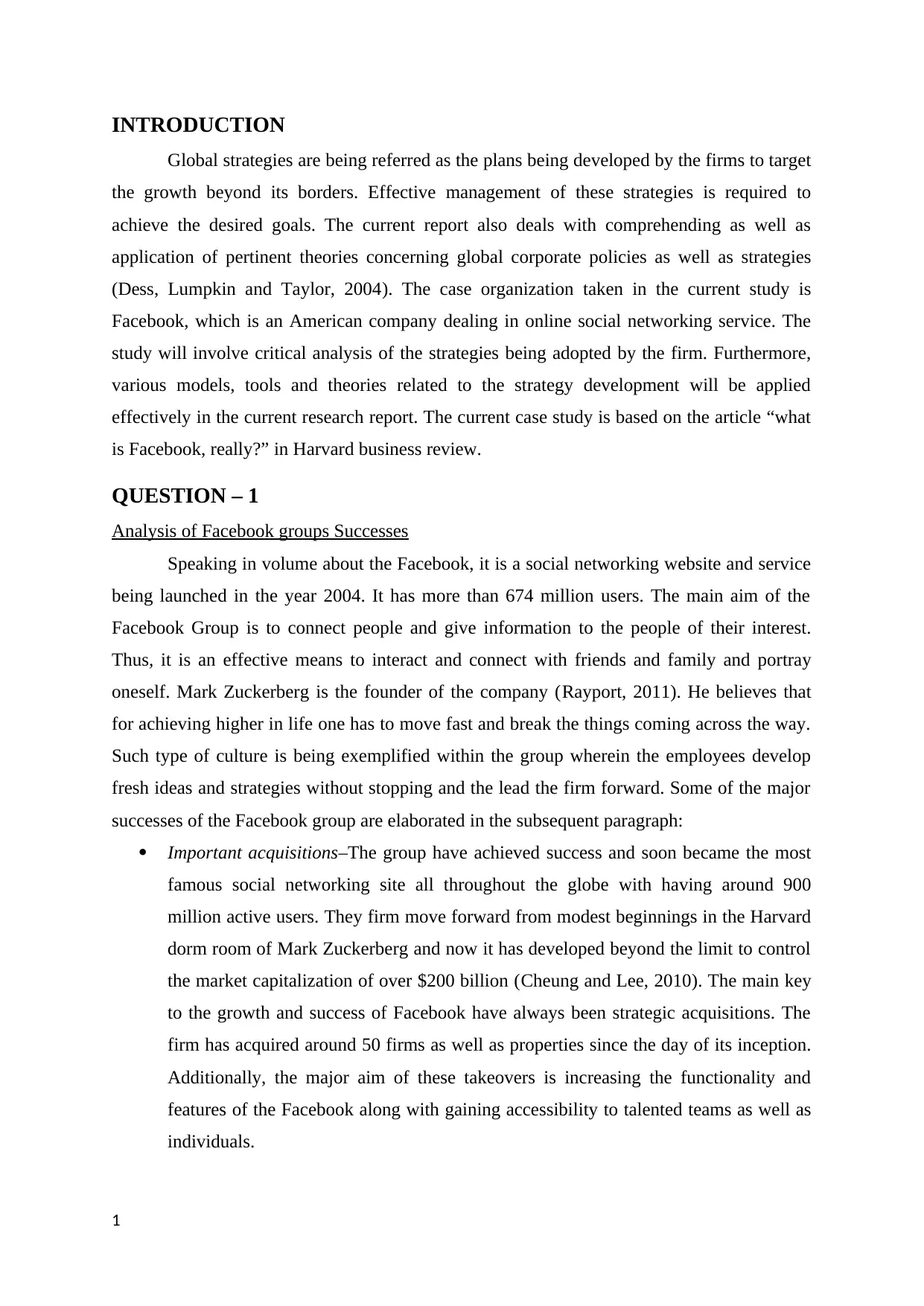
INTRODUCTION
Global strategies are being referred as the plans being developed by the firms to target
the growth beyond its borders. Effective management of these strategies is required to
achieve the desired goals. The current report also deals with comprehending as well as
application of pertinent theories concerning global corporate policies as well as strategies
(Dess, Lumpkin and Taylor, 2004). The case organization taken in the current study is
Facebook, which is an American company dealing in online social networking service. The
study will involve critical analysis of the strategies being adopted by the firm. Furthermore,
various models, tools and theories related to the strategy development will be applied
effectively in the current research report. The current case study is based on the article “what
is Facebook, really?” in Harvard business review.
QUESTION – 1
Analysis of Facebook groups Successes
Speaking in volume about the Facebook, it is a social networking website and service
being launched in the year 2004. It has more than 674 million users. The main aim of the
Facebook Group is to connect people and give information to the people of their interest.
Thus, it is an effective means to interact and connect with friends and family and portray
oneself. Mark Zuckerberg is the founder of the company (Rayport, 2011). He believes that
for achieving higher in life one has to move fast and break the things coming across the way.
Such type of culture is being exemplified within the group wherein the employees develop
fresh ideas and strategies without stopping and the lead the firm forward. Some of the major
successes of the Facebook group are elaborated in the subsequent paragraph:
Important acquisitions–The group have achieved success and soon became the most
famous social networking site all throughout the globe with having around 900
million active users. They firm move forward from modest beginnings in the Harvard
dorm room of Mark Zuckerberg and now it has developed beyond the limit to control
the market capitalization of over $200 billion (Cheung and Lee, 2010). The main key
to the growth and success of Facebook have always been strategic acquisitions. The
firm has acquired around 50 firms as well as properties since the day of its inception.
Additionally, the major aim of these takeovers is increasing the functionality and
features of the Facebook along with gaining accessibility to talented teams as well as
individuals.
1
Global strategies are being referred as the plans being developed by the firms to target
the growth beyond its borders. Effective management of these strategies is required to
achieve the desired goals. The current report also deals with comprehending as well as
application of pertinent theories concerning global corporate policies as well as strategies
(Dess, Lumpkin and Taylor, 2004). The case organization taken in the current study is
Facebook, which is an American company dealing in online social networking service. The
study will involve critical analysis of the strategies being adopted by the firm. Furthermore,
various models, tools and theories related to the strategy development will be applied
effectively in the current research report. The current case study is based on the article “what
is Facebook, really?” in Harvard business review.
QUESTION – 1
Analysis of Facebook groups Successes
Speaking in volume about the Facebook, it is a social networking website and service
being launched in the year 2004. It has more than 674 million users. The main aim of the
Facebook Group is to connect people and give information to the people of their interest.
Thus, it is an effective means to interact and connect with friends and family and portray
oneself. Mark Zuckerberg is the founder of the company (Rayport, 2011). He believes that
for achieving higher in life one has to move fast and break the things coming across the way.
Such type of culture is being exemplified within the group wherein the employees develop
fresh ideas and strategies without stopping and the lead the firm forward. Some of the major
successes of the Facebook group are elaborated in the subsequent paragraph:
Important acquisitions–The group have achieved success and soon became the most
famous social networking site all throughout the globe with having around 900
million active users. They firm move forward from modest beginnings in the Harvard
dorm room of Mark Zuckerberg and now it has developed beyond the limit to control
the market capitalization of over $200 billion (Cheung and Lee, 2010). The main key
to the growth and success of Facebook have always been strategic acquisitions. The
firm has acquired around 50 firms as well as properties since the day of its inception.
Additionally, the major aim of these takeovers is increasing the functionality and
features of the Facebook along with gaining accessibility to talented teams as well as
individuals.
1
Secure Best Marks with AI Grader
Need help grading? Try our AI Grader for instant feedback on your assignments.
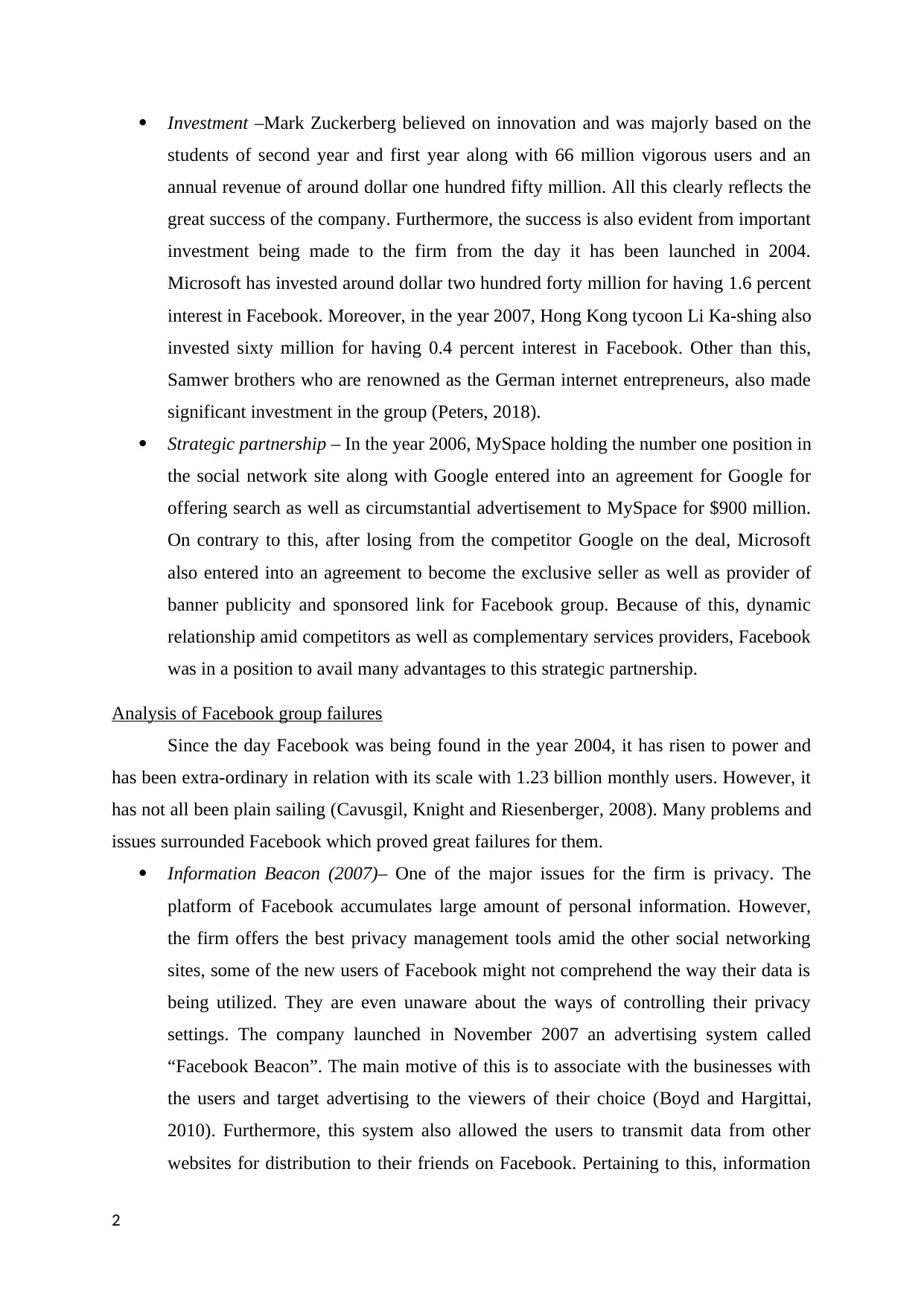
Investment –Mark Zuckerberg believed on innovation and was majorly based on the
students of second year and first year along with 66 million vigorous users and an
annual revenue of around dollar one hundred fifty million. All this clearly reflects the
great success of the company. Furthermore, the success is also evident from important
investment being made to the firm from the day it has been launched in 2004.
Microsoft has invested around dollar two hundred forty million for having 1.6 percent
interest in Facebook. Moreover, in the year 2007, Hong Kong tycoon Li Ka-shing also
invested sixty million for having 0.4 percent interest in Facebook. Other than this,
Samwer brothers who are renowned as the German internet entrepreneurs, also made
significant investment in the group (Peters, 2018).
Strategic partnership – In the year 2006, MySpace holding the number one position in
the social network site along with Google entered into an agreement for Google for
offering search as well as circumstantial advertisement to MySpace for $900 million.
On contrary to this, after losing from the competitor Google on the deal, Microsoft
also entered into an agreement to become the exclusive seller as well as provider of
banner publicity and sponsored link for Facebook group. Because of this, dynamic
relationship amid competitors as well as complementary services providers, Facebook
was in a position to avail many advantages to this strategic partnership.
Analysis of Facebook group failures
Since the day Facebook was being found in the year 2004, it has risen to power and
has been extra-ordinary in relation with its scale with 1.23 billion monthly users. However, it
has not all been plain sailing (Cavusgil, Knight and Riesenberger, 2008). Many problems and
issues surrounded Facebook which proved great failures for them.
Information Beacon (2007)– One of the major issues for the firm is privacy. The
platform of Facebook accumulates large amount of personal information. However,
the firm offers the best privacy management tools amid the other social networking
sites, some of the new users of Facebook might not comprehend the way their data is
being utilized. They are even unaware about the ways of controlling their privacy
settings. The company launched in November 2007 an advertising system called
“Facebook Beacon”. The main motive of this is to associate with the businesses with
the users and target advertising to the viewers of their choice (Boyd and Hargittai,
2010). Furthermore, this system also allowed the users to transmit data from other
websites for distribution to their friends on Facebook. Pertaining to this, information
2
students of second year and first year along with 66 million vigorous users and an
annual revenue of around dollar one hundred fifty million. All this clearly reflects the
great success of the company. Furthermore, the success is also evident from important
investment being made to the firm from the day it has been launched in 2004.
Microsoft has invested around dollar two hundred forty million for having 1.6 percent
interest in Facebook. Moreover, in the year 2007, Hong Kong tycoon Li Ka-shing also
invested sixty million for having 0.4 percent interest in Facebook. Other than this,
Samwer brothers who are renowned as the German internet entrepreneurs, also made
significant investment in the group (Peters, 2018).
Strategic partnership – In the year 2006, MySpace holding the number one position in
the social network site along with Google entered into an agreement for Google for
offering search as well as circumstantial advertisement to MySpace for $900 million.
On contrary to this, after losing from the competitor Google on the deal, Microsoft
also entered into an agreement to become the exclusive seller as well as provider of
banner publicity and sponsored link for Facebook group. Because of this, dynamic
relationship amid competitors as well as complementary services providers, Facebook
was in a position to avail many advantages to this strategic partnership.
Analysis of Facebook group failures
Since the day Facebook was being found in the year 2004, it has risen to power and
has been extra-ordinary in relation with its scale with 1.23 billion monthly users. However, it
has not all been plain sailing (Cavusgil, Knight and Riesenberger, 2008). Many problems and
issues surrounded Facebook which proved great failures for them.
Information Beacon (2007)– One of the major issues for the firm is privacy. The
platform of Facebook accumulates large amount of personal information. However,
the firm offers the best privacy management tools amid the other social networking
sites, some of the new users of Facebook might not comprehend the way their data is
being utilized. They are even unaware about the ways of controlling their privacy
settings. The company launched in November 2007 an advertising system called
“Facebook Beacon”. The main motive of this is to associate with the businesses with
the users and target advertising to the viewers of their choice (Boyd and Hargittai,
2010). Furthermore, this system also allowed the users to transmit data from other
websites for distribution to their friends on Facebook. Pertaining to this, information
2
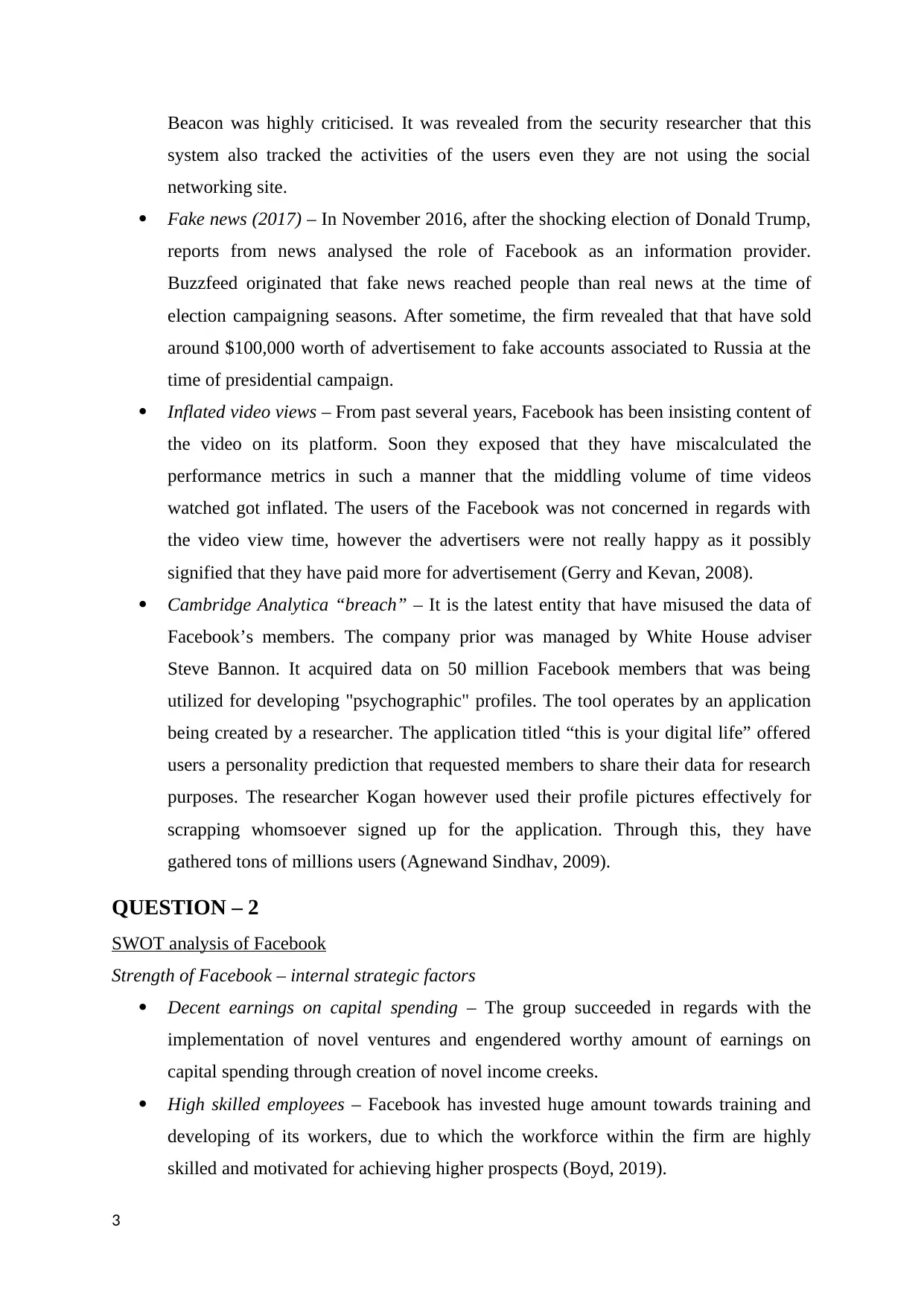
Beacon was highly criticised. It was revealed from the security researcher that this
system also tracked the activities of the users even they are not using the social
networking site.
Fake news (2017) – In November 2016, after the shocking election of Donald Trump,
reports from news analysed the role of Facebook as an information provider.
Buzzfeed originated that fake news reached people than real news at the time of
election campaigning seasons. After sometime, the firm revealed that that have sold
around $100,000 worth of advertisement to fake accounts associated to Russia at the
time of presidential campaign.
Inflated video views – From past several years, Facebook has been insisting content of
the video on its platform. Soon they exposed that they have miscalculated the
performance metrics in such a manner that the middling volume of time videos
watched got inflated. The users of the Facebook was not concerned in regards with
the video view time, however the advertisers were not really happy as it possibly
signified that they have paid more for advertisement (Gerry and Kevan, 2008).
Cambridge Analytica “breach” – It is the latest entity that have misused the data of
Facebook’s members. The company prior was managed by White House adviser
Steve Bannon. It acquired data on 50 million Facebook members that was being
utilized for developing "psychographic" profiles. The tool operates by an application
being created by a researcher. The application titled “this is your digital life” offered
users a personality prediction that requested members to share their data for research
purposes. The researcher Kogan however used their profile pictures effectively for
scrapping whomsoever signed up for the application. Through this, they have
gathered tons of millions users (Agnewand Sindhav, 2009).
QUESTION – 2
SWOT analysis of Facebook
Strength of Facebook – internal strategic factors
Decent earnings on capital spending – The group succeeded in regards with the
implementation of novel ventures and engendered worthy amount of earnings on
capital spending through creation of novel income creeks.
High skilled employees – Facebook has invested huge amount towards training and
developing of its workers, due to which the workforce within the firm are highly
skilled and motivated for achieving higher prospects (Boyd, 2019).
3
system also tracked the activities of the users even they are not using the social
networking site.
Fake news (2017) – In November 2016, after the shocking election of Donald Trump,
reports from news analysed the role of Facebook as an information provider.
Buzzfeed originated that fake news reached people than real news at the time of
election campaigning seasons. After sometime, the firm revealed that that have sold
around $100,000 worth of advertisement to fake accounts associated to Russia at the
time of presidential campaign.
Inflated video views – From past several years, Facebook has been insisting content of
the video on its platform. Soon they exposed that they have miscalculated the
performance metrics in such a manner that the middling volume of time videos
watched got inflated. The users of the Facebook was not concerned in regards with
the video view time, however the advertisers were not really happy as it possibly
signified that they have paid more for advertisement (Gerry and Kevan, 2008).
Cambridge Analytica “breach” – It is the latest entity that have misused the data of
Facebook’s members. The company prior was managed by White House adviser
Steve Bannon. It acquired data on 50 million Facebook members that was being
utilized for developing "psychographic" profiles. The tool operates by an application
being created by a researcher. The application titled “this is your digital life” offered
users a personality prediction that requested members to share their data for research
purposes. The researcher Kogan however used their profile pictures effectively for
scrapping whomsoever signed up for the application. Through this, they have
gathered tons of millions users (Agnewand Sindhav, 2009).
QUESTION – 2
SWOT analysis of Facebook
Strength of Facebook – internal strategic factors
Decent earnings on capital spending – The group succeeded in regards with the
implementation of novel ventures and engendered worthy amount of earnings on
capital spending through creation of novel income creeks.
High skilled employees – Facebook has invested huge amount towards training and
developing of its workers, due to which the workforce within the firm are highly
skilled and motivated for achieving higher prospects (Boyd, 2019).
3
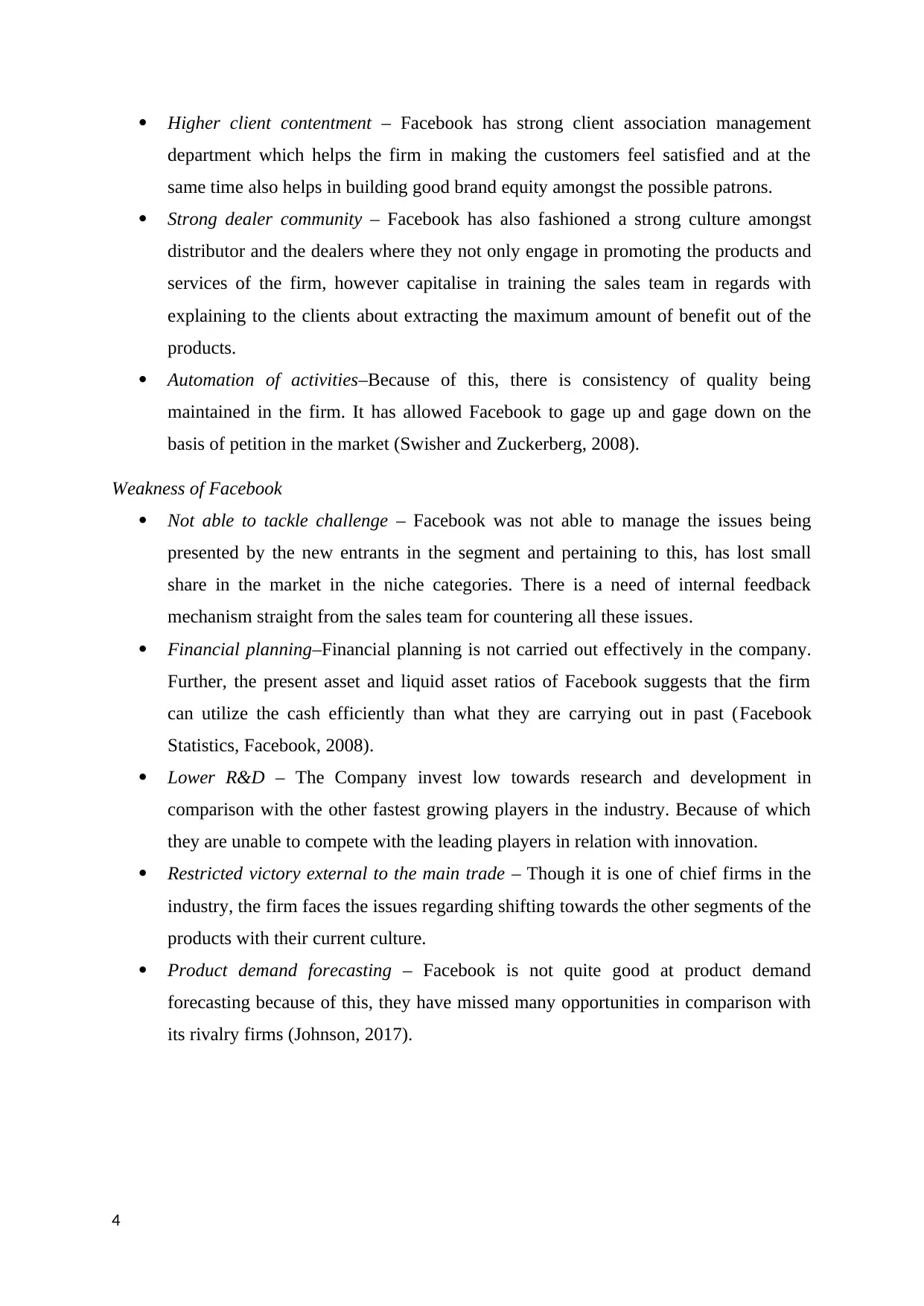
Higher client contentment – Facebook has strong client association management
department which helps the firm in making the customers feel satisfied and at the
same time also helps in building good brand equity amongst the possible patrons.
Strong dealer community – Facebook has also fashioned a strong culture amongst
distributor and the dealers where they not only engage in promoting the products and
services of the firm, however capitalise in training the sales team in regards with
explaining to the clients about extracting the maximum amount of benefit out of the
products.
Automation of activities–Because of this, there is consistency of quality being
maintained in the firm. It has allowed Facebook to gage up and gage down on the
basis of petition in the market (Swisher and Zuckerberg, 2008).
Weakness of Facebook
Not able to tackle challenge – Facebook was not able to manage the issues being
presented by the new entrants in the segment and pertaining to this, has lost small
share in the market in the niche categories. There is a need of internal feedback
mechanism straight from the sales team for countering all these issues.
Financial planning–Financial planning is not carried out effectively in the company.
Further, the present asset and liquid asset ratios of Facebook suggests that the firm
can utilize the cash efficiently than what they are carrying out in past (Facebook
Statistics, Facebook, 2008).
Lower R&D – The Company invest low towards research and development in
comparison with the other fastest growing players in the industry. Because of which
they are unable to compete with the leading players in relation with innovation.
Restricted victory external to the main trade – Though it is one of chief firms in the
industry, the firm faces the issues regarding shifting towards the other segments of the
products with their current culture.
Product demand forecasting – Facebook is not quite good at product demand
forecasting because of this, they have missed many opportunities in comparison with
its rivalry firms (Johnson, 2017).
4
department which helps the firm in making the customers feel satisfied and at the
same time also helps in building good brand equity amongst the possible patrons.
Strong dealer community – Facebook has also fashioned a strong culture amongst
distributor and the dealers where they not only engage in promoting the products and
services of the firm, however capitalise in training the sales team in regards with
explaining to the clients about extracting the maximum amount of benefit out of the
products.
Automation of activities–Because of this, there is consistency of quality being
maintained in the firm. It has allowed Facebook to gage up and gage down on the
basis of petition in the market (Swisher and Zuckerberg, 2008).
Weakness of Facebook
Not able to tackle challenge – Facebook was not able to manage the issues being
presented by the new entrants in the segment and pertaining to this, has lost small
share in the market in the niche categories. There is a need of internal feedback
mechanism straight from the sales team for countering all these issues.
Financial planning–Financial planning is not carried out effectively in the company.
Further, the present asset and liquid asset ratios of Facebook suggests that the firm
can utilize the cash efficiently than what they are carrying out in past (Facebook
Statistics, Facebook, 2008).
Lower R&D – The Company invest low towards research and development in
comparison with the other fastest growing players in the industry. Because of which
they are unable to compete with the leading players in relation with innovation.
Restricted victory external to the main trade – Though it is one of chief firms in the
industry, the firm faces the issues regarding shifting towards the other segments of the
products with their current culture.
Product demand forecasting – Facebook is not quite good at product demand
forecasting because of this, they have missed many opportunities in comparison with
its rivalry firms (Johnson, 2017).
4
Paraphrase This Document
Need a fresh take? Get an instant paraphrase of this document with our AI Paraphraser
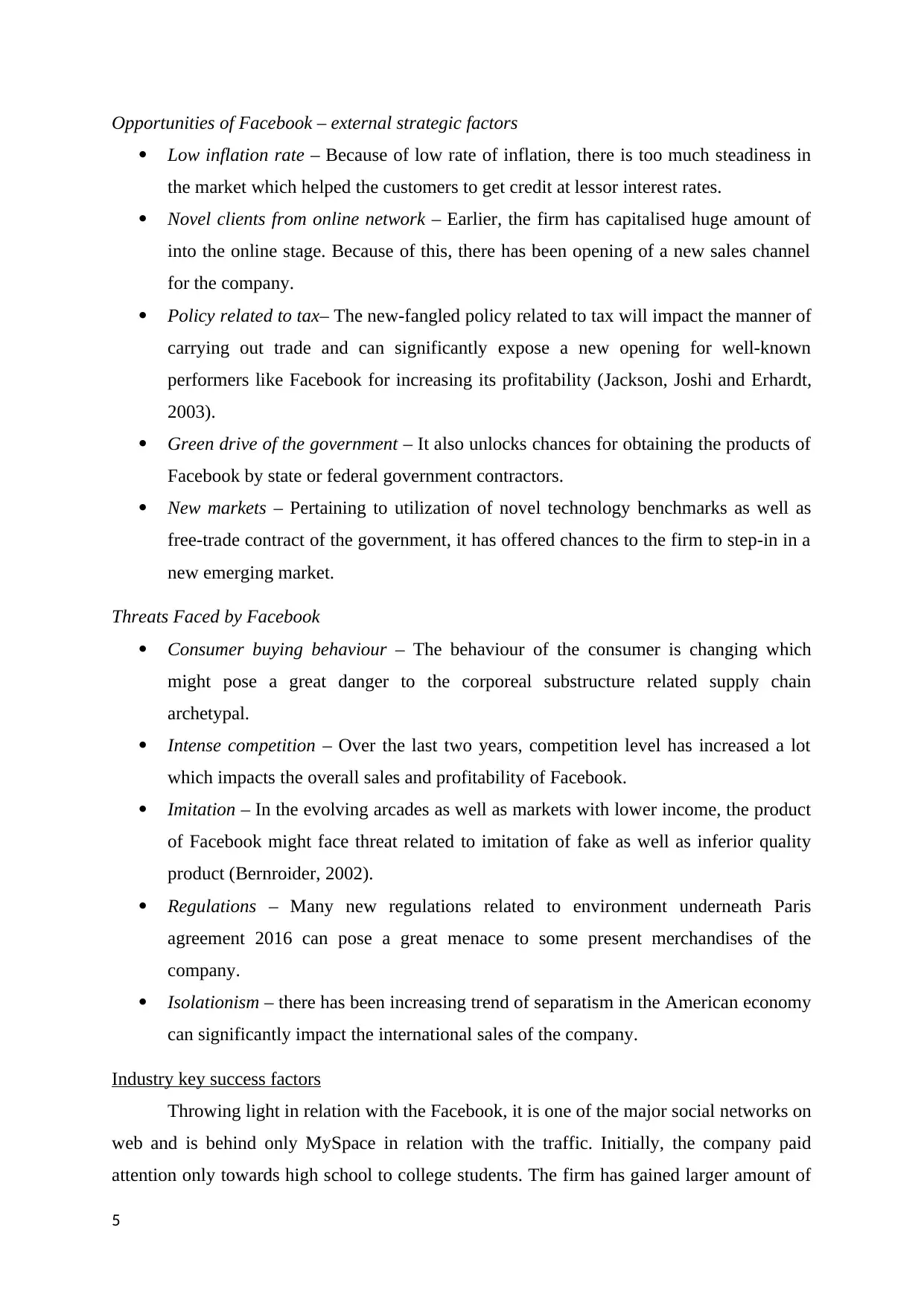
Opportunities of Facebook – external strategic factors
Low inflation rate – Because of low rate of inflation, there is too much steadiness in
the market which helped the customers to get credit at lessor interest rates.
Novel clients from online network – Earlier, the firm has capitalised huge amount of
into the online stage. Because of this, there has been opening of a new sales channel
for the company.
Policy related to tax– The new-fangled policy related to tax will impact the manner of
carrying out trade and can significantly expose a new opening for well-known
performers like Facebook for increasing its profitability (Jackson, Joshi and Erhardt,
2003).
Green drive of the government – It also unlocks chances for obtaining the products of
Facebook by state or federal government contractors.
New markets – Pertaining to utilization of novel technology benchmarks as well as
free-trade contract of the government, it has offered chances to the firm to step-in in a
new emerging market.
Threats Faced by Facebook
Consumer buying behaviour – The behaviour of the consumer is changing which
might pose a great danger to the corporeal substructure related supply chain
archetypal.
Intense competition – Over the last two years, competition level has increased a lot
which impacts the overall sales and profitability of Facebook.
Imitation – In the evolving arcades as well as markets with lower income, the product
of Facebook might face threat related to imitation of fake as well as inferior quality
product (Bernroider, 2002).
Regulations – Many new regulations related to environment underneath Paris
agreement 2016 can pose a great menace to some present merchandises of the
company.
Isolationism – there has been increasing trend of separatism in the American economy
can significantly impact the international sales of the company.
Industry key success factors
Throwing light in relation with the Facebook, it is one of the major social networks on
web and is behind only MySpace in relation with the traffic. Initially, the company paid
attention only towards high school to college students. The firm has gained larger amount of
5
Low inflation rate – Because of low rate of inflation, there is too much steadiness in
the market which helped the customers to get credit at lessor interest rates.
Novel clients from online network – Earlier, the firm has capitalised huge amount of
into the online stage. Because of this, there has been opening of a new sales channel
for the company.
Policy related to tax– The new-fangled policy related to tax will impact the manner of
carrying out trade and can significantly expose a new opening for well-known
performers like Facebook for increasing its profitability (Jackson, Joshi and Erhardt,
2003).
Green drive of the government – It also unlocks chances for obtaining the products of
Facebook by state or federal government contractors.
New markets – Pertaining to utilization of novel technology benchmarks as well as
free-trade contract of the government, it has offered chances to the firm to step-in in a
new emerging market.
Threats Faced by Facebook
Consumer buying behaviour – The behaviour of the consumer is changing which
might pose a great danger to the corporeal substructure related supply chain
archetypal.
Intense competition – Over the last two years, competition level has increased a lot
which impacts the overall sales and profitability of Facebook.
Imitation – In the evolving arcades as well as markets with lower income, the product
of Facebook might face threat related to imitation of fake as well as inferior quality
product (Bernroider, 2002).
Regulations – Many new regulations related to environment underneath Paris
agreement 2016 can pose a great menace to some present merchandises of the
company.
Isolationism – there has been increasing trend of separatism in the American economy
can significantly impact the international sales of the company.
Industry key success factors
Throwing light in relation with the Facebook, it is one of the major social networks on
web and is behind only MySpace in relation with the traffic. Initially, the company paid
attention only towards high school to college students. The firm has gained larger amount of
5
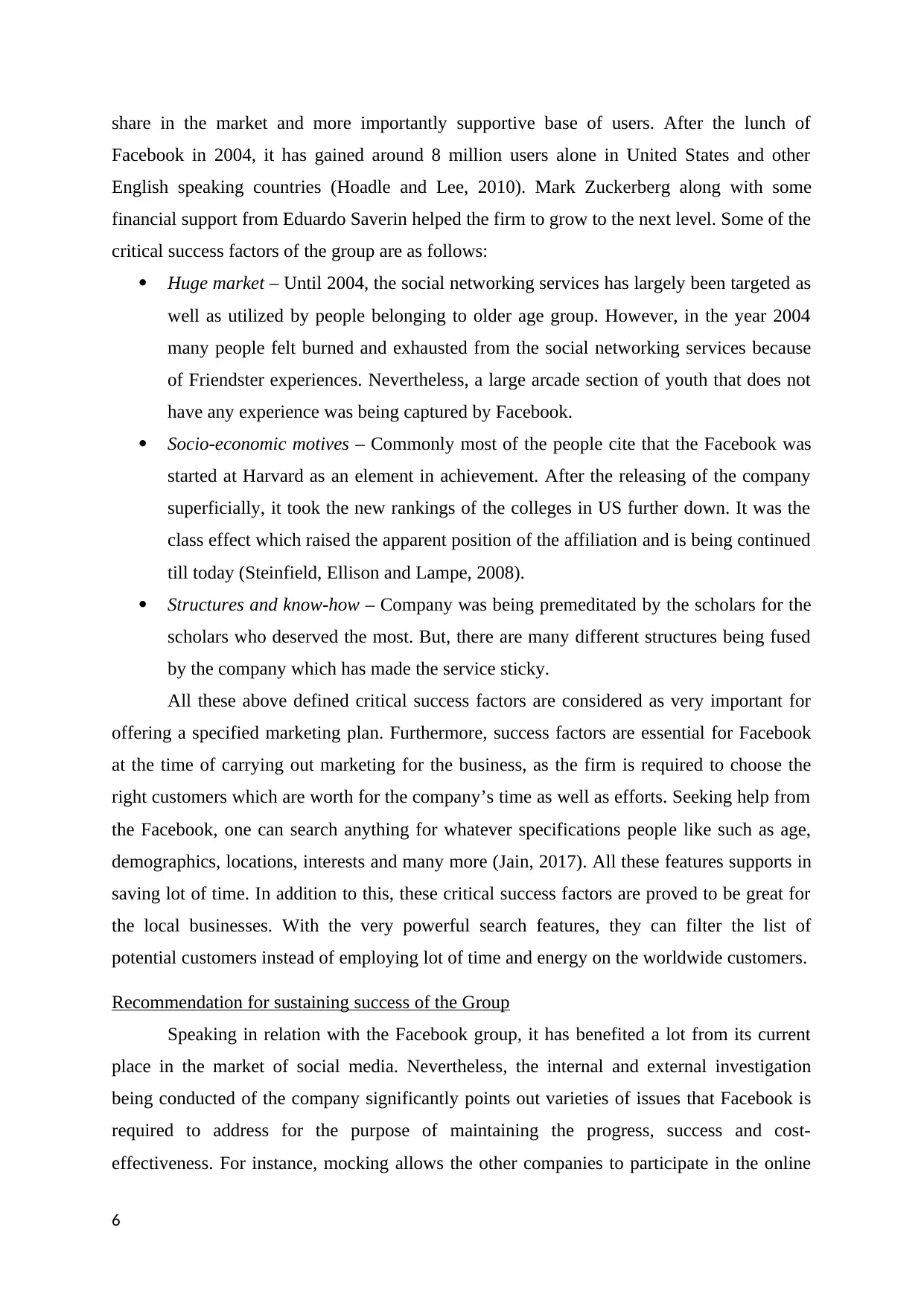
share in the market and more importantly supportive base of users. After the lunch of
Facebook in 2004, it has gained around 8 million users alone in United States and other
English speaking countries (Hoadle and Lee, 2010). Mark Zuckerberg along with some
financial support from Eduardo Saverin helped the firm to grow to the next level. Some of the
critical success factors of the group are as follows:
Huge market – Until 2004, the social networking services has largely been targeted as
well as utilized by people belonging to older age group. However, in the year 2004
many people felt burned and exhausted from the social networking services because
of Friendster experiences. Nevertheless, a large arcade section of youth that does not
have any experience was being captured by Facebook.
Socio-economic motives – Commonly most of the people cite that the Facebook was
started at Harvard as an element in achievement. After the releasing of the company
superficially, it took the new rankings of the colleges in US further down. It was the
class effect which raised the apparent position of the affiliation and is being continued
till today (Steinfield, Ellison and Lampe, 2008).
Structures and know-how – Company was being premeditated by the scholars for the
scholars who deserved the most. But, there are many different structures being fused
by the company which has made the service sticky.
All these above defined critical success factors are considered as very important for
offering a specified marketing plan. Furthermore, success factors are essential for Facebook
at the time of carrying out marketing for the business, as the firm is required to choose the
right customers which are worth for the company’s time as well as efforts. Seeking help from
the Facebook, one can search anything for whatever specifications people like such as age,
demographics, locations, interests and many more (Jain, 2017). All these features supports in
saving lot of time. In addition to this, these critical success factors are proved to be great for
the local businesses. With the very powerful search features, they can filter the list of
potential customers instead of employing lot of time and energy on the worldwide customers.
Recommendation for sustaining success of the Group
Speaking in relation with the Facebook group, it has benefited a lot from its current
place in the market of social media. Nevertheless, the internal and external investigation
being conducted of the company significantly points out varieties of issues that Facebook is
required to address for the purpose of maintaining the progress, success and cost-
effectiveness. For instance, mocking allows the other companies to participate in the online
6
Facebook in 2004, it has gained around 8 million users alone in United States and other
English speaking countries (Hoadle and Lee, 2010). Mark Zuckerberg along with some
financial support from Eduardo Saverin helped the firm to grow to the next level. Some of the
critical success factors of the group are as follows:
Huge market – Until 2004, the social networking services has largely been targeted as
well as utilized by people belonging to older age group. However, in the year 2004
many people felt burned and exhausted from the social networking services because
of Friendster experiences. Nevertheless, a large arcade section of youth that does not
have any experience was being captured by Facebook.
Socio-economic motives – Commonly most of the people cite that the Facebook was
started at Harvard as an element in achievement. After the releasing of the company
superficially, it took the new rankings of the colleges in US further down. It was the
class effect which raised the apparent position of the affiliation and is being continued
till today (Steinfield, Ellison and Lampe, 2008).
Structures and know-how – Company was being premeditated by the scholars for the
scholars who deserved the most. But, there are many different structures being fused
by the company which has made the service sticky.
All these above defined critical success factors are considered as very important for
offering a specified marketing plan. Furthermore, success factors are essential for Facebook
at the time of carrying out marketing for the business, as the firm is required to choose the
right customers which are worth for the company’s time as well as efforts. Seeking help from
the Facebook, one can search anything for whatever specifications people like such as age,
demographics, locations, interests and many more (Jain, 2017). All these features supports in
saving lot of time. In addition to this, these critical success factors are proved to be great for
the local businesses. With the very powerful search features, they can filter the list of
potential customers instead of employing lot of time and energy on the worldwide customers.
Recommendation for sustaining success of the Group
Speaking in relation with the Facebook group, it has benefited a lot from its current
place in the market of social media. Nevertheless, the internal and external investigation
being conducted of the company significantly points out varieties of issues that Facebook is
required to address for the purpose of maintaining the progress, success and cost-
effectiveness. For instance, mocking allows the other companies to participate in the online
6
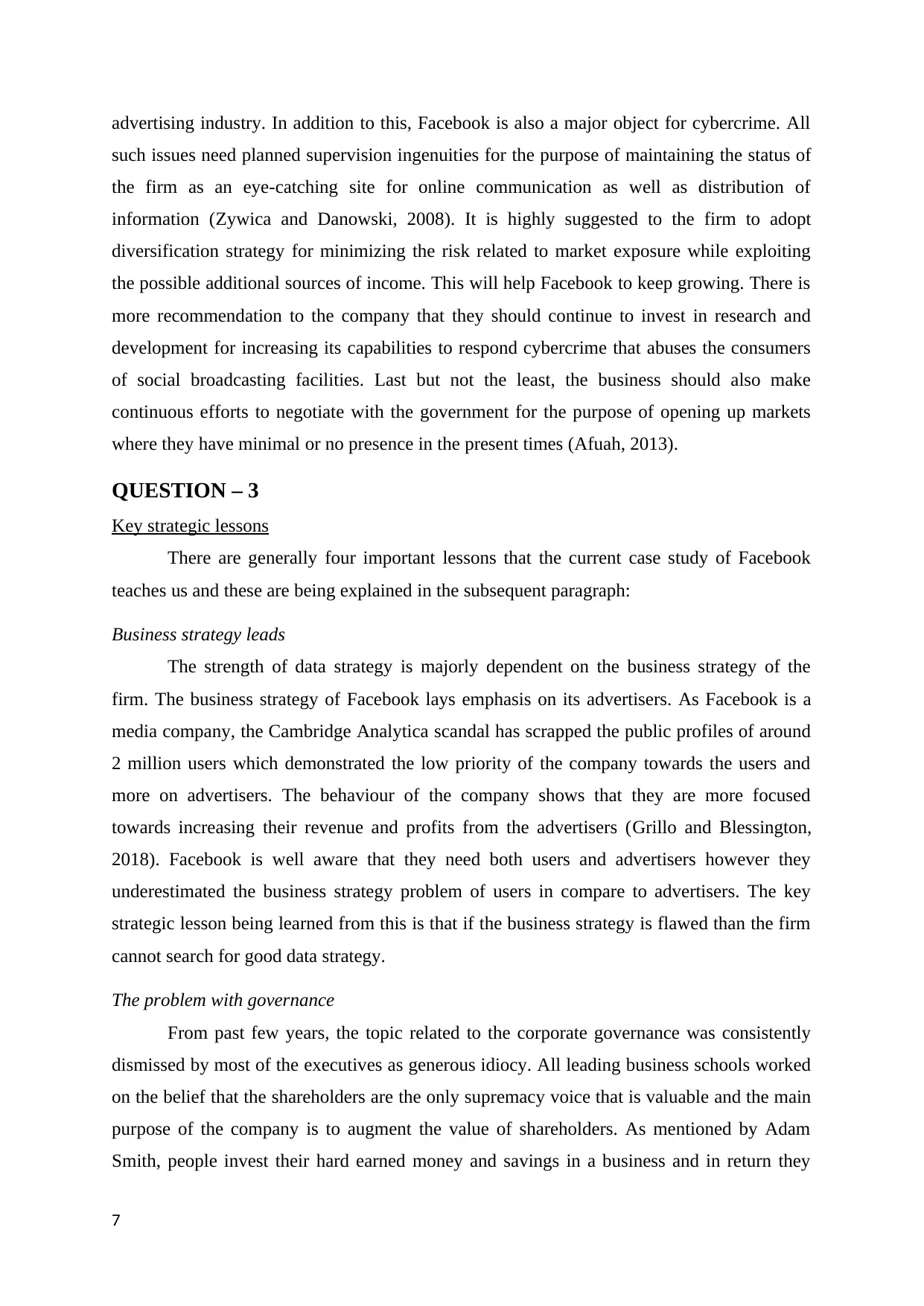
advertising industry. In addition to this, Facebook is also a major object for cybercrime. All
such issues need planned supervision ingenuities for the purpose of maintaining the status of
the firm as an eye-catching site for online communication as well as distribution of
information (Zywica and Danowski, 2008). It is highly suggested to the firm to adopt
diversification strategy for minimizing the risk related to market exposure while exploiting
the possible additional sources of income. This will help Facebook to keep growing. There is
more recommendation to the company that they should continue to invest in research and
development for increasing its capabilities to respond cybercrime that abuses the consumers
of social broadcasting facilities. Last but not the least, the business should also make
continuous efforts to negotiate with the government for the purpose of opening up markets
where they have minimal or no presence in the present times (Afuah, 2013).
QUESTION – 3
Key strategic lessons
There are generally four important lessons that the current case study of Facebook
teaches us and these are being explained in the subsequent paragraph:
Business strategy leads
The strength of data strategy is majorly dependent on the business strategy of the
firm. The business strategy of Facebook lays emphasis on its advertisers. As Facebook is a
media company, the Cambridge Analytica scandal has scrapped the public profiles of around
2 million users which demonstrated the low priority of the company towards the users and
more on advertisers. The behaviour of the company shows that they are more focused
towards increasing their revenue and profits from the advertisers (Grillo and Blessington,
2018). Facebook is well aware that they need both users and advertisers however they
underestimated the business strategy problem of users in compare to advertisers. The key
strategic lesson being learned from this is that if the business strategy is flawed than the firm
cannot search for good data strategy.
The problem with governance
From past few years, the topic related to the corporate governance was consistently
dismissed by most of the executives as generous idiocy. All leading business schools worked
on the belief that the shareholders are the only supremacy voice that is valuable and the main
purpose of the company is to augment the value of shareholders. As mentioned by Adam
Smith, people invest their hard earned money and savings in a business and in return they
7
such issues need planned supervision ingenuities for the purpose of maintaining the status of
the firm as an eye-catching site for online communication as well as distribution of
information (Zywica and Danowski, 2008). It is highly suggested to the firm to adopt
diversification strategy for minimizing the risk related to market exposure while exploiting
the possible additional sources of income. This will help Facebook to keep growing. There is
more recommendation to the company that they should continue to invest in research and
development for increasing its capabilities to respond cybercrime that abuses the consumers
of social broadcasting facilities. Last but not the least, the business should also make
continuous efforts to negotiate with the government for the purpose of opening up markets
where they have minimal or no presence in the present times (Afuah, 2013).
QUESTION – 3
Key strategic lessons
There are generally four important lessons that the current case study of Facebook
teaches us and these are being explained in the subsequent paragraph:
Business strategy leads
The strength of data strategy is majorly dependent on the business strategy of the
firm. The business strategy of Facebook lays emphasis on its advertisers. As Facebook is a
media company, the Cambridge Analytica scandal has scrapped the public profiles of around
2 million users which demonstrated the low priority of the company towards the users and
more on advertisers. The behaviour of the company shows that they are more focused
towards increasing their revenue and profits from the advertisers (Grillo and Blessington,
2018). Facebook is well aware that they need both users and advertisers however they
underestimated the business strategy problem of users in compare to advertisers. The key
strategic lesson being learned from this is that if the business strategy is flawed than the firm
cannot search for good data strategy.
The problem with governance
From past few years, the topic related to the corporate governance was consistently
dismissed by most of the executives as generous idiocy. All leading business schools worked
on the belief that the shareholders are the only supremacy voice that is valuable and the main
purpose of the company is to augment the value of shareholders. As mentioned by Adam
Smith, people invest their hard earned money and savings in a business and in return they
7
Secure Best Marks with AI Grader
Need help grading? Try our AI Grader for instant feedback on your assignments.
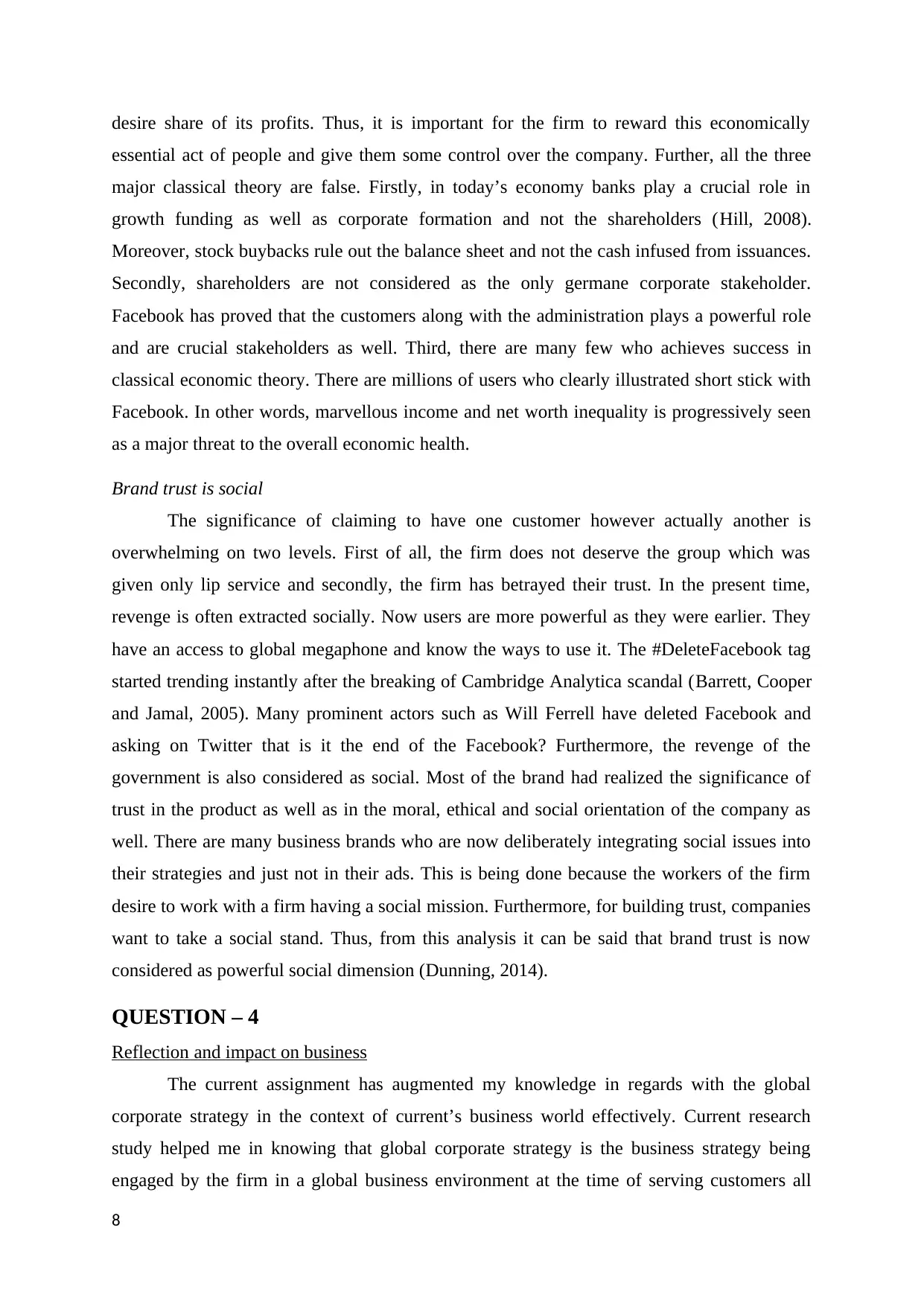
desire share of its profits. Thus, it is important for the firm to reward this economically
essential act of people and give them some control over the company. Further, all the three
major classical theory are false. Firstly, in today’s economy banks play a crucial role in
growth funding as well as corporate formation and not the shareholders (Hill, 2008).
Moreover, stock buybacks rule out the balance sheet and not the cash infused from issuances.
Secondly, shareholders are not considered as the only germane corporate stakeholder.
Facebook has proved that the customers along with the administration plays a powerful role
and are crucial stakeholders as well. Third, there are many few who achieves success in
classical economic theory. There are millions of users who clearly illustrated short stick with
Facebook. In other words, marvellous income and net worth inequality is progressively seen
as a major threat to the overall economic health.
Brand trust is social
The significance of claiming to have one customer however actually another is
overwhelming on two levels. First of all, the firm does not deserve the group which was
given only lip service and secondly, the firm has betrayed their trust. In the present time,
revenge is often extracted socially. Now users are more powerful as they were earlier. They
have an access to global megaphone and know the ways to use it. The #DeleteFacebook tag
started trending instantly after the breaking of Cambridge Analytica scandal (Barrett, Cooper
and Jamal, 2005). Many prominent actors such as Will Ferrell have deleted Facebook and
asking on Twitter that is it the end of the Facebook? Furthermore, the revenge of the
government is also considered as social. Most of the brand had realized the significance of
trust in the product as well as in the moral, ethical and social orientation of the company as
well. There are many business brands who are now deliberately integrating social issues into
their strategies and just not in their ads. This is being done because the workers of the firm
desire to work with a firm having a social mission. Furthermore, for building trust, companies
want to take a social stand. Thus, from this analysis it can be said that brand trust is now
considered as powerful social dimension (Dunning, 2014).
QUESTION – 4
Reflection and impact on business
The current assignment has augmented my knowledge in regards with the global
corporate strategy in the context of current’s business world effectively. Current research
study helped me in knowing that global corporate strategy is the business strategy being
engaged by the firm in a global business environment at the time of serving customers all
8
essential act of people and give them some control over the company. Further, all the three
major classical theory are false. Firstly, in today’s economy banks play a crucial role in
growth funding as well as corporate formation and not the shareholders (Hill, 2008).
Moreover, stock buybacks rule out the balance sheet and not the cash infused from issuances.
Secondly, shareholders are not considered as the only germane corporate stakeholder.
Facebook has proved that the customers along with the administration plays a powerful role
and are crucial stakeholders as well. Third, there are many few who achieves success in
classical economic theory. There are millions of users who clearly illustrated short stick with
Facebook. In other words, marvellous income and net worth inequality is progressively seen
as a major threat to the overall economic health.
Brand trust is social
The significance of claiming to have one customer however actually another is
overwhelming on two levels. First of all, the firm does not deserve the group which was
given only lip service and secondly, the firm has betrayed their trust. In the present time,
revenge is often extracted socially. Now users are more powerful as they were earlier. They
have an access to global megaphone and know the ways to use it. The #DeleteFacebook tag
started trending instantly after the breaking of Cambridge Analytica scandal (Barrett, Cooper
and Jamal, 2005). Many prominent actors such as Will Ferrell have deleted Facebook and
asking on Twitter that is it the end of the Facebook? Furthermore, the revenge of the
government is also considered as social. Most of the brand had realized the significance of
trust in the product as well as in the moral, ethical and social orientation of the company as
well. There are many business brands who are now deliberately integrating social issues into
their strategies and just not in their ads. This is being done because the workers of the firm
desire to work with a firm having a social mission. Furthermore, for building trust, companies
want to take a social stand. Thus, from this analysis it can be said that brand trust is now
considered as powerful social dimension (Dunning, 2014).
QUESTION – 4
Reflection and impact on business
The current assignment has augmented my knowledge in regards with the global
corporate strategy in the context of current’s business world effectively. Current research
study helped me in knowing that global corporate strategy is the business strategy being
engaged by the firm in a global business environment at the time of serving customers all
8
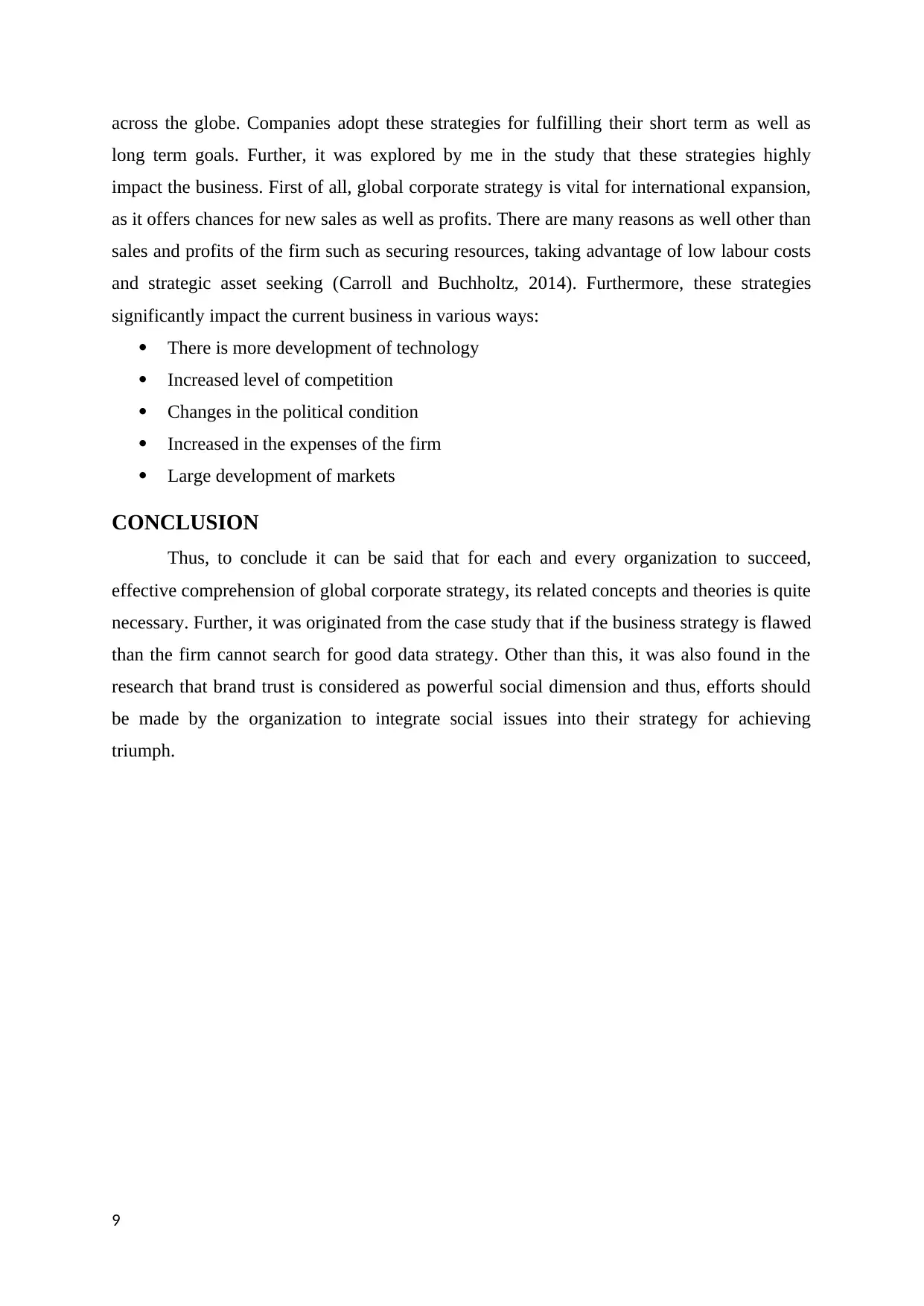
across the globe. Companies adopt these strategies for fulfilling their short term as well as
long term goals. Further, it was explored by me in the study that these strategies highly
impact the business. First of all, global corporate strategy is vital for international expansion,
as it offers chances for new sales as well as profits. There are many reasons as well other than
sales and profits of the firm such as securing resources, taking advantage of low labour costs
and strategic asset seeking (Carroll and Buchholtz, 2014). Furthermore, these strategies
significantly impact the current business in various ways:
There is more development of technology
Increased level of competition
Changes in the political condition
Increased in the expenses of the firm
Large development of markets
CONCLUSION
Thus, to conclude it can be said that for each and every organization to succeed,
effective comprehension of global corporate strategy, its related concepts and theories is quite
necessary. Further, it was originated from the case study that if the business strategy is flawed
than the firm cannot search for good data strategy. Other than this, it was also found in the
research that brand trust is considered as powerful social dimension and thus, efforts should
be made by the organization to integrate social issues into their strategy for achieving
triumph.
9
long term goals. Further, it was explored by me in the study that these strategies highly
impact the business. First of all, global corporate strategy is vital for international expansion,
as it offers chances for new sales as well as profits. There are many reasons as well other than
sales and profits of the firm such as securing resources, taking advantage of low labour costs
and strategic asset seeking (Carroll and Buchholtz, 2014). Furthermore, these strategies
significantly impact the current business in various ways:
There is more development of technology
Increased level of competition
Changes in the political condition
Increased in the expenses of the firm
Large development of markets
CONCLUSION
Thus, to conclude it can be said that for each and every organization to succeed,
effective comprehension of global corporate strategy, its related concepts and theories is quite
necessary. Further, it was originated from the case study that if the business strategy is flawed
than the firm cannot search for good data strategy. Other than this, it was also found in the
research that brand trust is considered as powerful social dimension and thus, efforts should
be made by the organization to integrate social issues into their strategy for achieving
triumph.
9
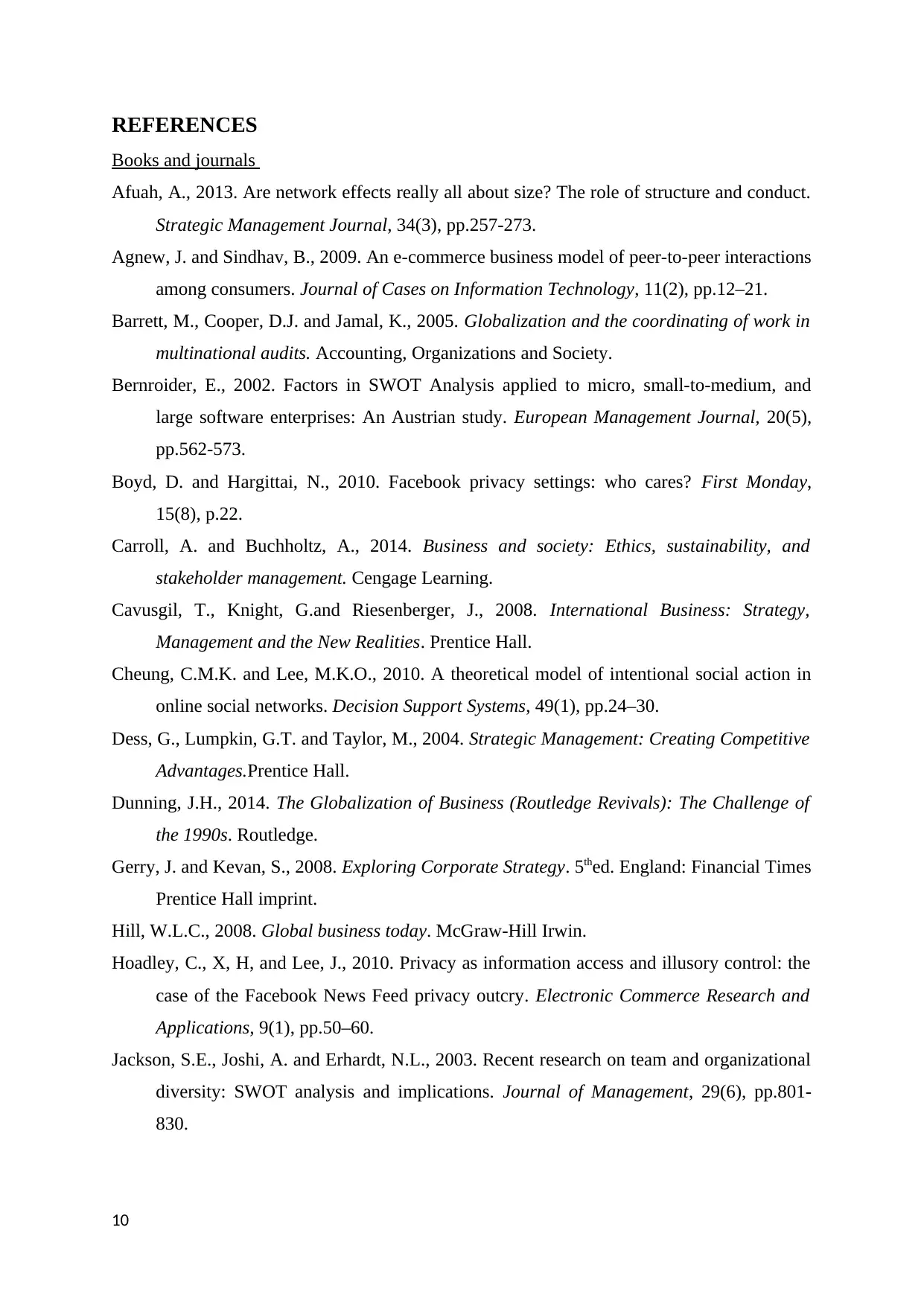
REFERENCES
Books and journals
Afuah, A., 2013. Are network effects really all about size? The role of structure and conduct.
Strategic Management Journal, 34(3), pp.257-273.
Agnew, J. and Sindhav, B., 2009. An e-commerce business model of peer-to-peer interactions
among consumers. Journal of Cases on Information Technology, 11(2), pp.12–21.
Barrett, M., Cooper, D.J. and Jamal, K., 2005. Globalization and the coordinating of work in
multinational audits. Accounting, Organizations and Society.
Bernroider, E., 2002. Factors in SWOT Analysis applied to micro, small-to-medium, and
large software enterprises: An Austrian study. European Management Journal, 20(5),
pp.562-573.
Boyd, D. and Hargittai, N., 2010. Facebook privacy settings: who cares? First Monday,
15(8), p.22.
Carroll, A. and Buchholtz, A., 2014. Business and society: Ethics, sustainability, and
stakeholder management. Cengage Learning.
Cavusgil, T., Knight, G.and Riesenberger, J., 2008. International Business: Strategy,
Management and the New Realities. Prentice Hall.
Cheung, C.M.K. and Lee, M.K.O., 2010. A theoretical model of intentional social action in
online social networks. Decision Support Systems, 49(1), pp.24–30.
Dess, G., Lumpkin, G.T. and Taylor, M., 2004. Strategic Management: Creating Competitive
Advantages.Prentice Hall.
Dunning, J.H., 2014. The Globalization of Business (Routledge Revivals): The Challenge of
the 1990s. Routledge.
Gerry, J. and Kevan, S., 2008. Exploring Corporate Strategy. 5thed. England: Financial Times
Prentice Hall imprint.
Hill, W.L.C., 2008. Global business today. McGraw-Hill Irwin.
Hoadley, C., X, H, and Lee, J., 2010. Privacy as information access and illusory control: the
case of the Facebook News Feed privacy outcry. Electronic Commerce Research and
Applications, 9(1), pp.50–60.
Jackson, S.E., Joshi, A. and Erhardt, N.L., 2003. Recent research on team and organizational
diversity: SWOT analysis and implications. Journal of Management, 29(6), pp.801-
830.
10
Books and journals
Afuah, A., 2013. Are network effects really all about size? The role of structure and conduct.
Strategic Management Journal, 34(3), pp.257-273.
Agnew, J. and Sindhav, B., 2009. An e-commerce business model of peer-to-peer interactions
among consumers. Journal of Cases on Information Technology, 11(2), pp.12–21.
Barrett, M., Cooper, D.J. and Jamal, K., 2005. Globalization and the coordinating of work in
multinational audits. Accounting, Organizations and Society.
Bernroider, E., 2002. Factors in SWOT Analysis applied to micro, small-to-medium, and
large software enterprises: An Austrian study. European Management Journal, 20(5),
pp.562-573.
Boyd, D. and Hargittai, N., 2010. Facebook privacy settings: who cares? First Monday,
15(8), p.22.
Carroll, A. and Buchholtz, A., 2014. Business and society: Ethics, sustainability, and
stakeholder management. Cengage Learning.
Cavusgil, T., Knight, G.and Riesenberger, J., 2008. International Business: Strategy,
Management and the New Realities. Prentice Hall.
Cheung, C.M.K. and Lee, M.K.O., 2010. A theoretical model of intentional social action in
online social networks. Decision Support Systems, 49(1), pp.24–30.
Dess, G., Lumpkin, G.T. and Taylor, M., 2004. Strategic Management: Creating Competitive
Advantages.Prentice Hall.
Dunning, J.H., 2014. The Globalization of Business (Routledge Revivals): The Challenge of
the 1990s. Routledge.
Gerry, J. and Kevan, S., 2008. Exploring Corporate Strategy. 5thed. England: Financial Times
Prentice Hall imprint.
Hill, W.L.C., 2008. Global business today. McGraw-Hill Irwin.
Hoadley, C., X, H, and Lee, J., 2010. Privacy as information access and illusory control: the
case of the Facebook News Feed privacy outcry. Electronic Commerce Research and
Applications, 9(1), pp.50–60.
Jackson, S.E., Joshi, A. and Erhardt, N.L., 2003. Recent research on team and organizational
diversity: SWOT analysis and implications. Journal of Management, 29(6), pp.801-
830.
10
Paraphrase This Document
Need a fresh take? Get an instant paraphrase of this document with our AI Paraphraser
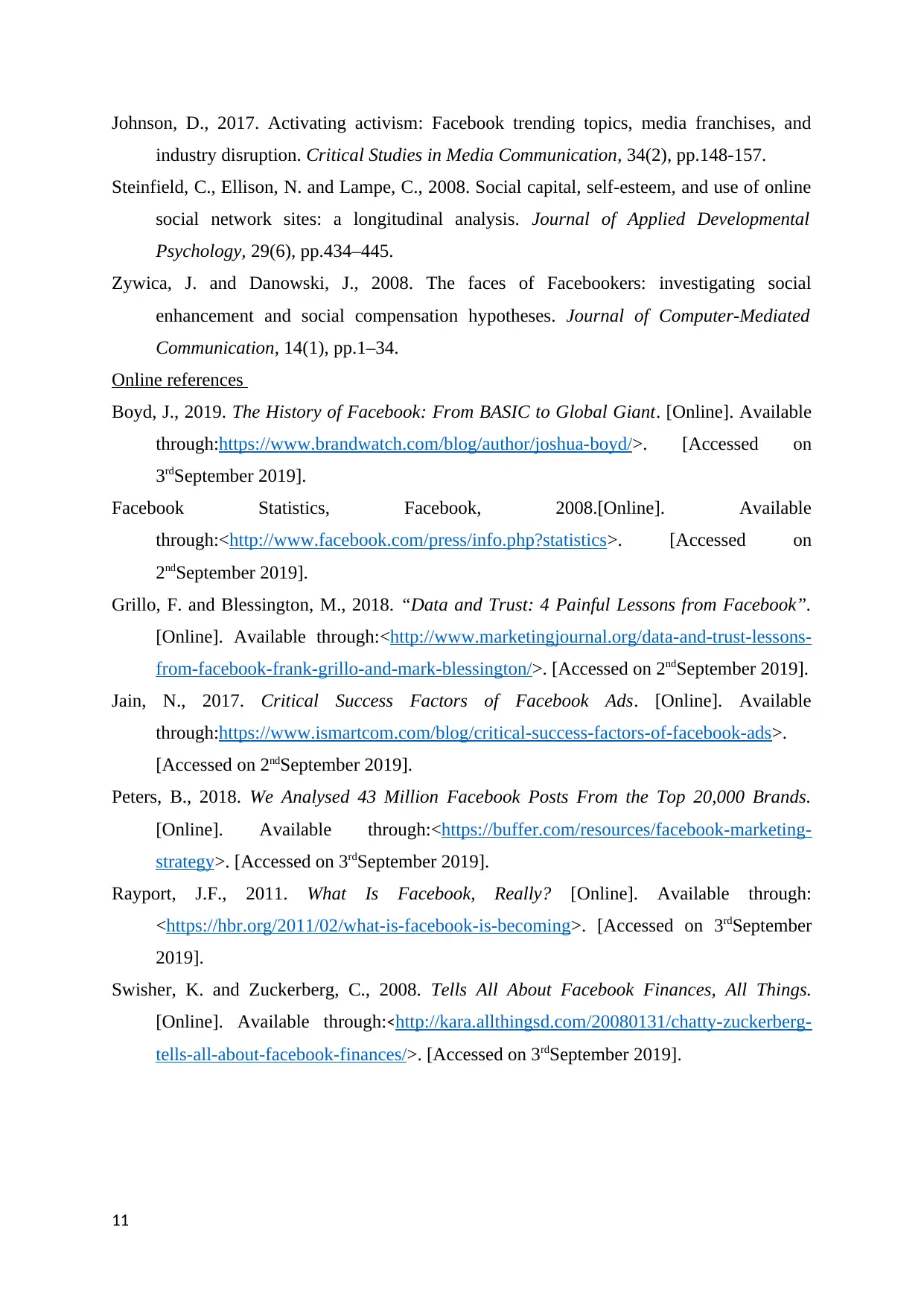
Johnson, D., 2017. Activating activism: Facebook trending topics, media franchises, and
industry disruption. Critical Studies in Media Communication, 34(2), pp.148-157.
Steinfield, C., Ellison, N. and Lampe, C., 2008. Social capital, self-esteem, and use of online
social network sites: a longitudinal analysis. Journal of Applied Developmental
Psychology, 29(6), pp.434–445.
Zywica, J. and Danowski, J., 2008. The faces of Facebookers: investigating social
enhancement and social compensation hypotheses. Journal of Computer-Mediated
Communication, 14(1), pp.1–34.
Online references
Boyd, J., 2019. The History of Facebook: From BASIC to Global Giant. [Online]. Available
through:https://www.brandwatch.com/blog/author/joshua-boyd/>. [Accessed on
3rdSeptember 2019].
Facebook Statistics, Facebook, 2008.[Online]. Available
through:<http://www.facebook.com/press/info.php?statistics>. [Accessed on
2ndSeptember 2019].
Grillo, F. and Blessington, M., 2018. “Data and Trust: 4 Painful Lessons from Facebook”.
[Online]. Available through:<http://www.marketingjournal.org/data-and-trust-lessons-
from-facebook-frank-grillo-and-mark-blessington/>. [Accessed on 2ndSeptember 2019].
Jain, N., 2017. Critical Success Factors of Facebook Ads. [Online]. Available
through:https://www.ismartcom.com/blog/critical-success-factors-of-facebook-ads>.
[Accessed on 2ndSeptember 2019].
Peters, B., 2018. We Analysed 43 Million Facebook Posts From the Top 20,000 Brands.
[Online]. Available through:<https://buffer.com/resources/facebook-marketing-
strategy>. [Accessed on 3rdSeptember 2019].
Rayport, J.F., 2011. What Is Facebook, Really? [Online]. Available through:
<https://hbr.org/2011/02/what-is-facebook-is-becoming>. [Accessed on 3rdSeptember
2019].
Swisher, K. and Zuckerberg, C., 2008. Tells All About Facebook Finances, All Things.
[Online]. Available through:<http://kara.allthingsd.com/20080131/chatty-zuckerberg-
tells-all-about-facebook-finances/>. [Accessed on 3rdSeptember 2019].
11
industry disruption. Critical Studies in Media Communication, 34(2), pp.148-157.
Steinfield, C., Ellison, N. and Lampe, C., 2008. Social capital, self-esteem, and use of online
social network sites: a longitudinal analysis. Journal of Applied Developmental
Psychology, 29(6), pp.434–445.
Zywica, J. and Danowski, J., 2008. The faces of Facebookers: investigating social
enhancement and social compensation hypotheses. Journal of Computer-Mediated
Communication, 14(1), pp.1–34.
Online references
Boyd, J., 2019. The History of Facebook: From BASIC to Global Giant. [Online]. Available
through:https://www.brandwatch.com/blog/author/joshua-boyd/>. [Accessed on
3rdSeptember 2019].
Facebook Statistics, Facebook, 2008.[Online]. Available
through:<http://www.facebook.com/press/info.php?statistics>. [Accessed on
2ndSeptember 2019].
Grillo, F. and Blessington, M., 2018. “Data and Trust: 4 Painful Lessons from Facebook”.
[Online]. Available through:<http://www.marketingjournal.org/data-and-trust-lessons-
from-facebook-frank-grillo-and-mark-blessington/>. [Accessed on 2ndSeptember 2019].
Jain, N., 2017. Critical Success Factors of Facebook Ads. [Online]. Available
through:https://www.ismartcom.com/blog/critical-success-factors-of-facebook-ads>.
[Accessed on 2ndSeptember 2019].
Peters, B., 2018. We Analysed 43 Million Facebook Posts From the Top 20,000 Brands.
[Online]. Available through:<https://buffer.com/resources/facebook-marketing-
strategy>. [Accessed on 3rdSeptember 2019].
Rayport, J.F., 2011. What Is Facebook, Really? [Online]. Available through:
<https://hbr.org/2011/02/what-is-facebook-is-becoming>. [Accessed on 3rdSeptember
2019].
Swisher, K. and Zuckerberg, C., 2008. Tells All About Facebook Finances, All Things.
[Online]. Available through:<http://kara.allthingsd.com/20080131/chatty-zuckerberg-
tells-all-about-facebook-finances/>. [Accessed on 3rdSeptember 2019].
11

12
1 out of 15
Related Documents
Your All-in-One AI-Powered Toolkit for Academic Success.
+13062052269
info@desklib.com
Available 24*7 on WhatsApp / Email
![[object Object]](/_next/static/media/star-bottom.7253800d.svg)
Unlock your academic potential
© 2024 | Zucol Services PVT LTD | All rights reserved.


